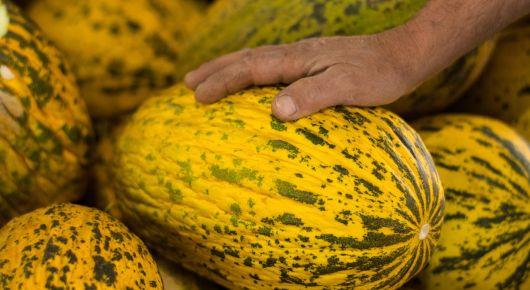Holistic approaches and reduced chemical use increase soil productivity and crop yields

The COVID-19 pandemic and related limitation measures make it hard for food producers and technical staff not only to work, but also to participate in training activities. Yet, agriculture has to go on and the need for increasing sustainability is larger than ever to save our limited resources and ensure food safety and security.
Even under these circumstances, an FAO project has undertaken the challenge of continuing the promotion of sustainable crop production practices, especially reduced pesticide use. Recently, over 400 people, including farmers and agricultural extension specialists, benefited from support under the “Lifecycle management of pesticides and disposal of POPs pesticides in Central Asian countries and Turkey” project funded by the Global Environmental Facility (GEF).
The trainings followed FAO’s “Save and Grow” model of sustainable intensification of crop production that aims for the highest possible productivity within the ecosystem's carrying capacity.
In collaboration with the Ankara Provincial Directorate of Ministry of Agriculture and Forestry, about 100 fruit producers received 1 800 pheromone traps that enable biotechnical control of the Mediterranean fruit fly (Ceratitis capitata) – a pest that causes substantial economic losses in fruit production and leads to an excessive use of pesticides. Throughout the season, the traps were monitored and farmers were provided assistance in Integrated Pest Management (IPM), focussing on not only biotechnical tactics, but also more holistic approaches.
Integrated Pest Management was further promoted in Ankara through training. Representatives of the Provincial Directorate visited the orchards of an additional 200 fruit producers in an outdoor training programme. Furthermore, a five-day online training-of-trainers was held for 110 extension specialists to discuss Integrated Pest Management methods for controlling the main plant pests and diseases in Ankara.
“The adoption of IPM strategies provides socio-economic benefits due to sustained development, increased productivity, and long-term improvements to the environment and health,” said Tania Santivanez, FAO agricultural officer and lead technical officer of the project. “The approach brings additional benefits, such as less dependency on chemicals, less yield losses, better soil productivity, and increased ecosystem services.”
Therefore, Santivanez sees the training for both the producers and extension specialists as “a true asset for a remarkable leap toward more sustainable and environmentally friendly agricultural production systems in Ankara.”
As Ahmet Demircan, a beneficiary local producer, remarked, “I realize now that we have paid attention neither to our own health nor to beneficial insects during the spraying operations. Thanks to the training, I have also learned the importance of encouraging beneficial insects who have a vital role in production. I have not implemented IPM before, but I will do in the future, as my perspective has changed.”
A local melon producer, Omer Kilic, complained about the decreasing productivity of his land. The training visit programme made him interested in Integrated Pest Management because of significant benefits in increasing productivity and decreasing pest resistance.
“Training for technical staff was a real success under the pandemic circumstances as it allowed reaching many people at the same time,” mentioned Ayse Cetin, moderator of the training-of-trainers session. “My colleagues found it really useful, saying that it will improve their communication with producers in terms of Integrated Pest Management.”
At the same time, Ankara Provincial Director Bulent Korkmaz drew attention to the increased market chances of low input products as an important incentive for producers in switching to IPM. “In addition to the achievements through the joint training activities, some beneficiaries who received pheromone traps managed to sell over 50 tonnes of pears with higher prices. This is a great encouragement for other producers in the region to implement Integrated Pest Management. Yet we need to work on more this missing link that is increasing market chances of low input products in IPM promotion.”
Integrated Pest Management is an ecosystem approach to crop production and protection that combines different management strategies and practices to grow healthy crops with the minimum amount of pesticides.
3 December 2020, Ankara, Turkey
